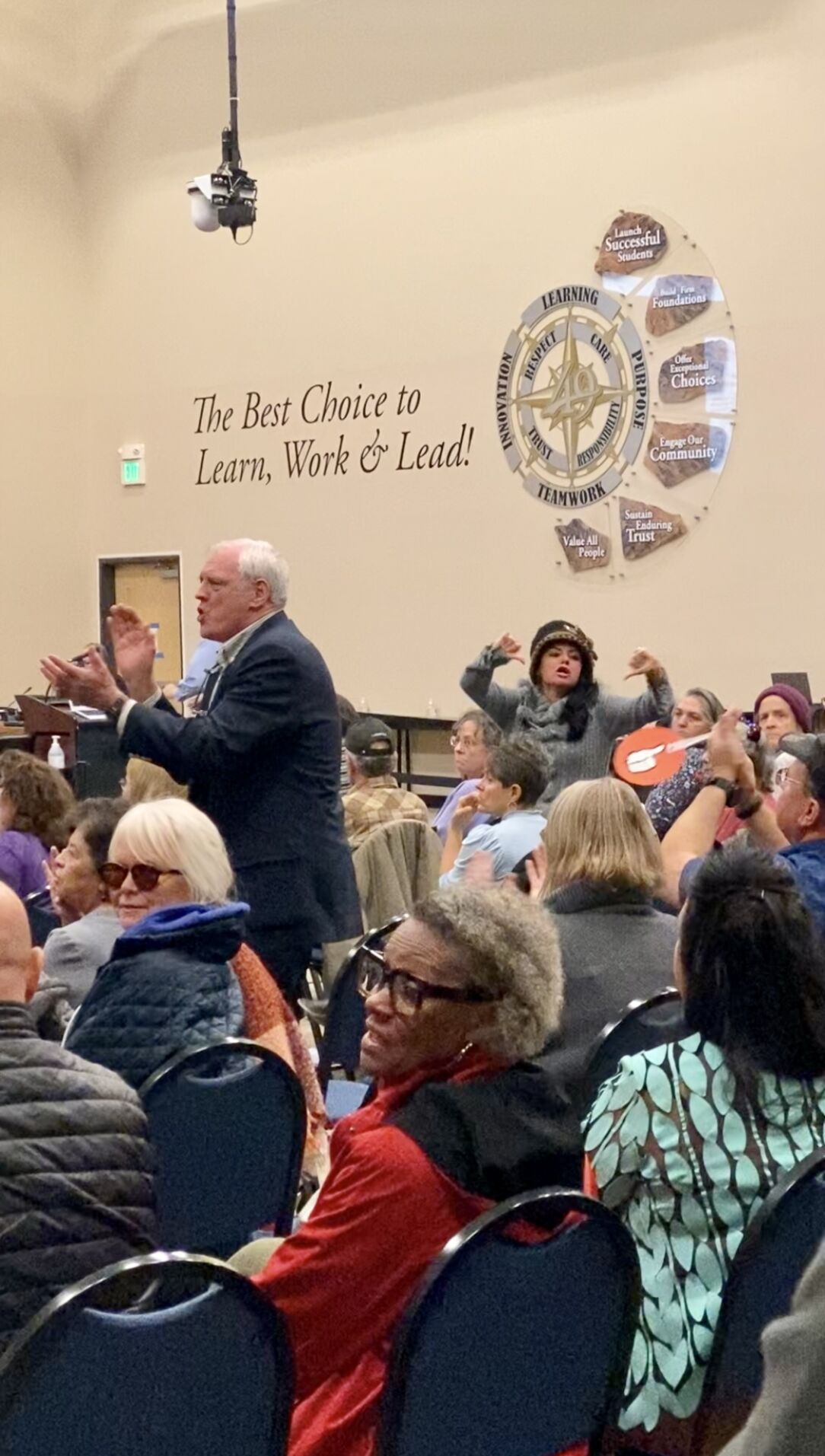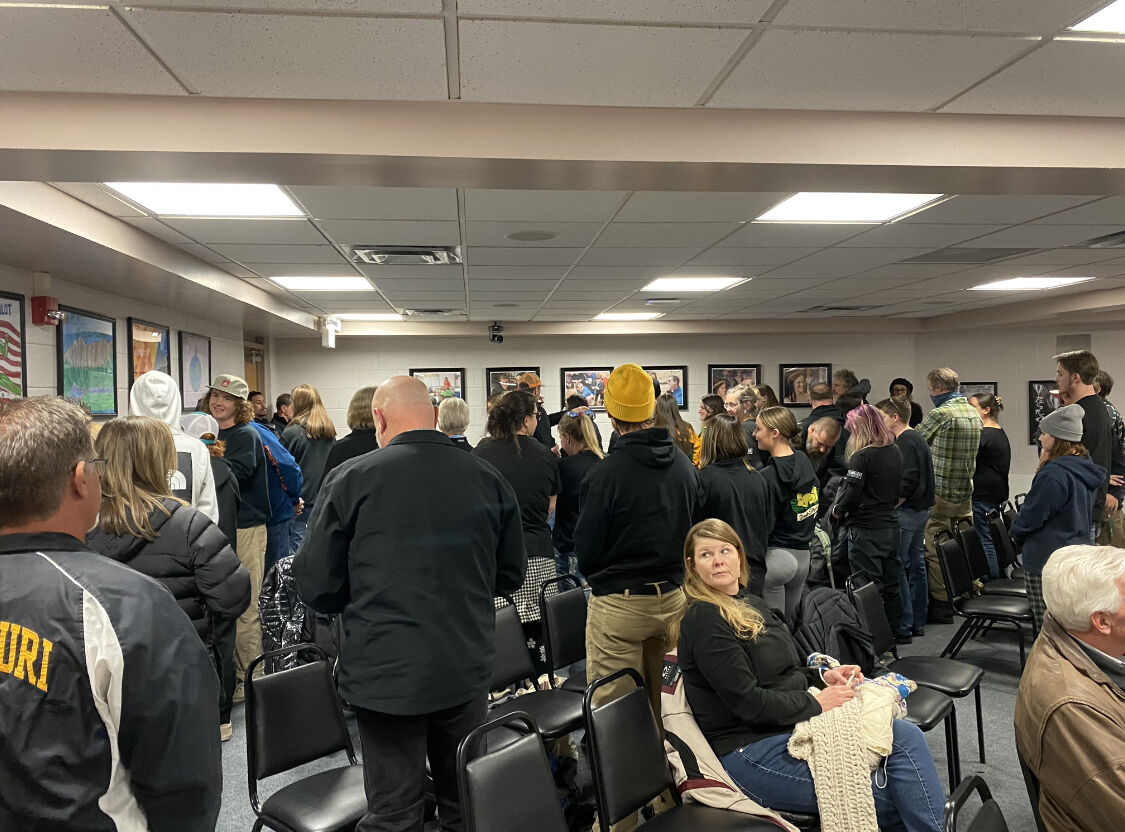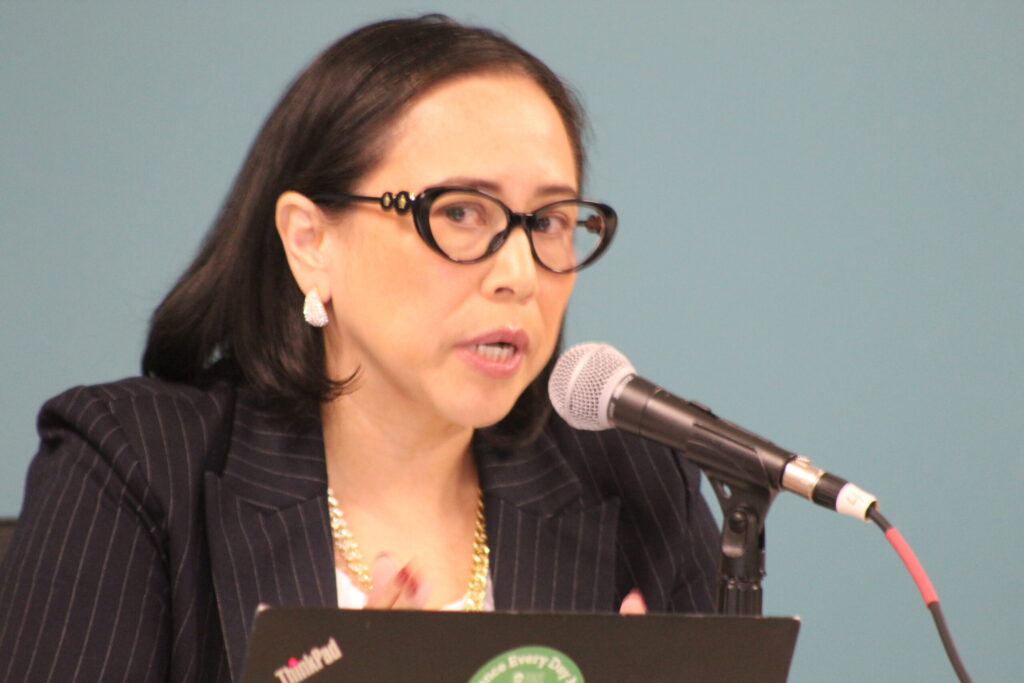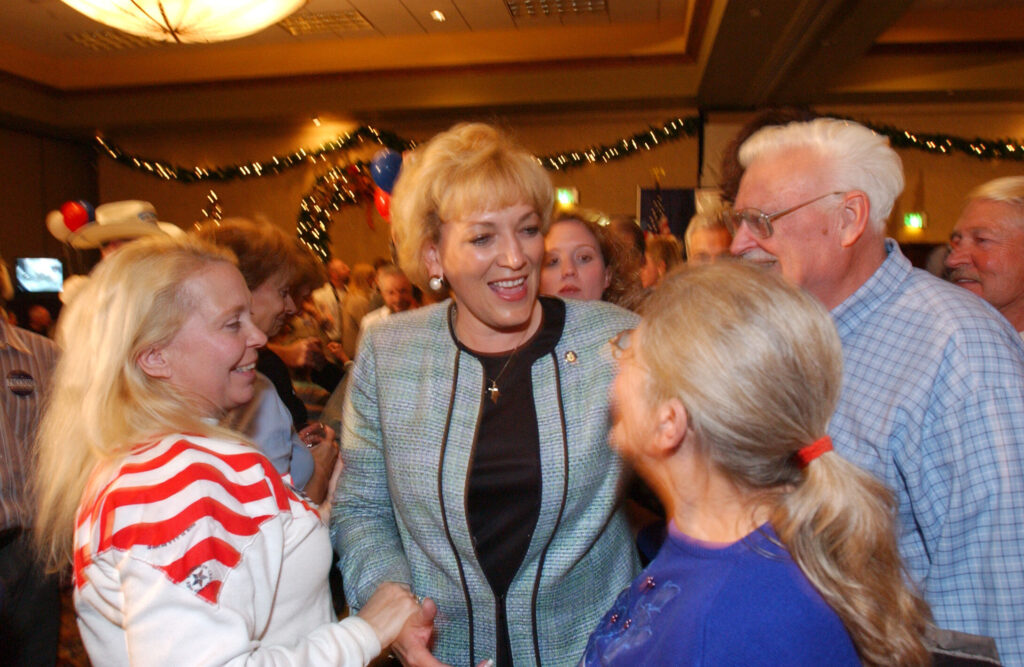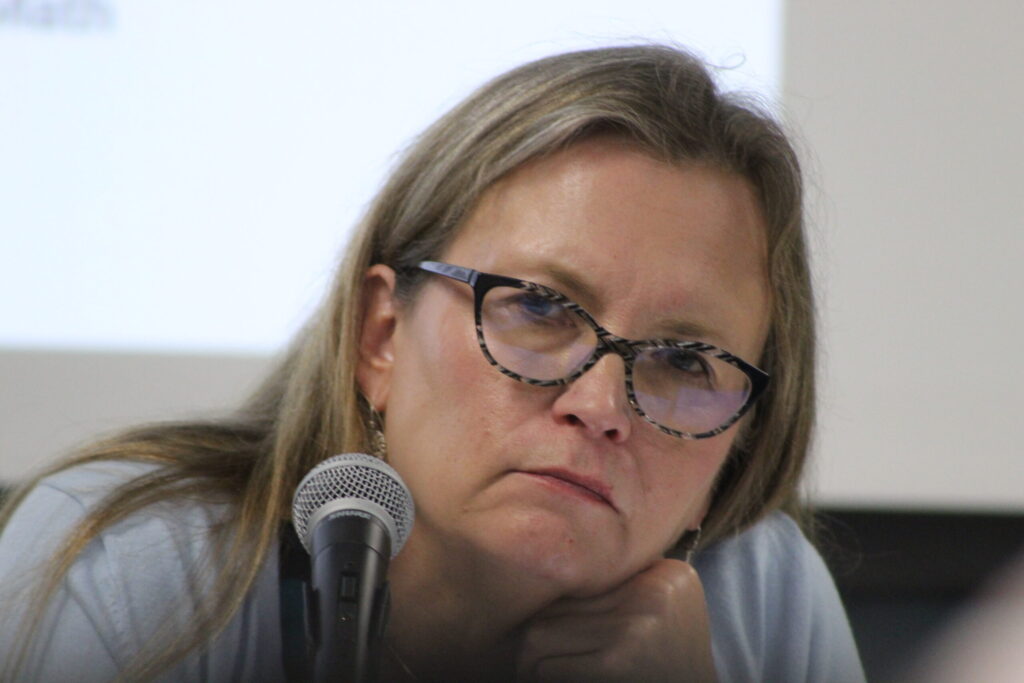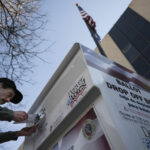Aggression at fiery El Paso County school board meetings prompts safety concerns

Student board representative Abigail Troup was shaking.
The bitter atmosphere at an April 13 School District 49 board meeting went from bad to worse during public comment, the Pikes Peak Early College senior said. Community members lobbed personal attacks at each other and at school leaders. One woman was escorted out of the building for cursing at a parent.
For the first time in her 13 years as a student in the district, Troup feared for her safety.
Syndi Ellis, another student board representative who sat at the dais beside Troup, took note of her friend’s nerves and felt she needed to act.
So Ellis spoke up, calling out the inappropriate behavior displayed by the adults in the room.
“You need to consider us as your kids because when there was a moment where we wanted to leave because it wasn’t safe, it didn’t feel safe anymore, that’s not OK,” Ellis said during the meeting.
School leaders across the country are grappling with behaviors that flout the rules of board room decorum as they say the focus has shifted toward partisan politics at the expense of the students they serve. In the Colorado Springs area, school districts have upped security measures and restructured meetings in an attempt to reframe the focus on their primary mission.
“It’s like they need a reminder, ‘Hey, you’re here for us,’ and they seem to forget that sometimes,” Ellis told The Gazette. “They get so personal and so angry about, you know, somebody makes a comment, and it instantly sets everybody ablaze: ‘Oh, I disagree. I don’t like that.’ We’re not always going to agree with what somebody else says, and that’s fine, but you can’t let that dominate why you’re there.”
‘Why so much security?’
Mirroring scenes from across the country, board room temperatures since the pandemic have risen to new heights in Colorado Springs School District 11, according to spokesperson Devra Ashby. In one regard, she said, it’s great to see participation increased. The community is more engaged than ever.
But that engagement has given way to name calling, fear mongering and, in some cases, more outright displays of aggression.
Protesters and counter-protesters came face-to-face in March over a staff conduct policy that some board members suggested should prohibit teachers from asking students their pronouns, a policy that still remains in subcommittee drafting.
Protesters on either side of the line flashed concealed handguns at one another, Superintendent Michael Gaal said, in an apparent attempt at intimidation. Police were called to mediate tensions and separate the groups outside the district office before the March 8 board meeting.
During the meeting, an audience member charged the dais with a letter to the board president despite rules prohibiting such threatening actions, prompting security to step in and escort the man to the hallway. A number of people were removed for breaking rules of decorum that evening, and security and police de-escalated several potentially unsafe situations.
The man’s letter asked, “Why so many police and why so much security?” The answer was simple. “You’re why,” Gaal later told the man. When community members act out of order, there’s no telling their motivations or whether they are armed.
“And I’ve got kids trying to come in to celebrate their school spotlight and sit up at the dais and thank a teacher,” Gaal said. “It’s a dichotomy. It’s an oxymoron.”
Gaal issued a letter to the D-11 community several days later urging parents to “start acting more like children,” who he said handle divergent opinions with much more grace than has been displayed by some of their elders.
“Most of our public comment is about very personally or politically charged issues, of which I would say it is difficult to prove one side right or wrong,” Gaal said. “Do both sides want to find a way that works for families, or do both sides just want their side to be right?”
In D-49, three “letters of no trespass” – one of which was later rescinded – have been issued so far this school year. The letters are a legal method of managing disruptive behaviors by barring individuals from school grounds. Zero letters were issued in the previous two years, a spokesperson said.
Tensions in the district came to a head at a Nov. 10 meeting in which board member Ivy Liu was publicly censured and asked to resign in a resolution passed by a 3-2 majority. Liu, in turn, called for board President John Graham to resign.
D-49 again bans ‘critical race theory’ amid bitter infighting on school board
Liu, who still serves on the board, had earlier that month come under fire for quoting Hitler on social media in what she said was an attempt to point out “toxic ideologies” and indoctrination infiltrating America’s education system.
Decorum violations saturated the meeting. Crowd members held up signs and repeatedly shirked the board’s request to stop speaking out of turn. The audience erupted into a frenzy of “boos” and applause after the board censured Liu. On several occasions the audience yelled over board members’ discussion and comments.
Lindsey Lee, the co-chair of community organization Neighbors for Education and a parent of two district children, said there have been several “fiery” meetings since November, although none have quite reached that level of animosity. Lee, however, experienced what she said was the most direct attack against her in April.
Lee used her public comment to commend teachers in light of a board resolution recognizing teacher appreciation week in May. She ended her comment as she has ended all comments since November: “Ivy Liu should resign.”
A woman seated behind her – and next to a group of young scouts receiving their merit badges – said “something to the effect of, ‘That purple shirt (expletive),'” in reference to Neighbors for Education’s identifying purple shirts, Lee said. Security removed the woman shortly thereafter.
When the woman briefly returned to retrieve her purse, she allegedly remarked to Lee, “I’m leaving, but you’re still (an expletive).”
The incident was a deciding factor that prompted Ellis and Troup to speak out, they said.
Lee said she was proud they stood up for themselves and put the adults on notice. She apologized after the meeting for any part she might have played in creating a hostile atmosphere.
“I felt chastised, and I hope any reasonable grown-ups in the room did as well,” Lee said.
A shared responsibility
D-49 has tightened up security protocols since November due in large part to behaviors demonstrated that night, said Graham, the board president. People were hitting others with their signs and requesting to be escorted to their cars in fear of harassment or worse.
The board at the time served as the primary enforcer of decorum, requesting from the dais that the audience calm down, he said. The board also used security only on an as-needed basis when it anticipated large turnouts.
Today, security attends every D-49 school board meeting and walks into the audience to stop unruly behavior.
“The safety and security of our campuses and buildings is non-negotiable,” Graham wrote in an email. “Repeated violations of decorum are a significant distraction to doing the work of the district.”
D-11 doubled its security presence from one guard to two following the March meeting. A guard now sits at the front of the room closest to the dais in a seat traditionally reserved for the chief academic officer, “the most important person on (Gaal’s) team.”
School leaders say it is the responsibility of all in attendance to uphold the rules of decorum to avoid more drastic measures like X-ray machines, pat-downs or purse bans. That responsibility extends to audience and board members alike.
As models of expected conduct, Graham said board members’ behavior has “quite a bit” of influence on that of the community. Recent infighting and profanity at the dais have muddied the waters and complicated matters.
Graham pointed to D-49’s seventh annual voice of the workforce survey as evidence that sour board behavior has troubling impacts. While more than three-quarters of respondents said they trusted district CEO Peter Hilts, who is a regular target of pointed accusations from some public and board commentators, less than half of district employees said they trusted the school board. The survey saw record participation with 92% of employees responding.
“When observers witness behavior from the board that doesn’t meet those standards in or out of the boardroom, it welcomes, or at least implies that violations of decorum are permitted, tolerated, or even encouraged. It promotes unacceptable behavior in others,” Graham said.
District 49 faces lawsuit over alleged free speech violations
But the passion at the heart of especially volatile public comments doesn’t have to be a negative, Gaal said. In fact, if he were to grade those comments, he would award them positive marks for that passion.
What they lack is a connection to a hypothesis, a data-informed if/then statement, he said. If a change were to happen, how might it impact student achievement and why?
Solutions are not binary, he adds, and people should remember that district leaders are making decisions for 22,000 families with different backgrounds and needs.
To that end, D-11 has restructured its board meetings to place students front and center with a celebration of their achievements and school spotlights to begin each meeting. Students are also invited to the superintendent’s chair to give shout-outs to beloved educators.
The shift anchors each night’s discussion in the student experience, Gaal said. He hopes to add student representatives to the dais much like D-49 in an effort to further ground the audience in its universal mission.
“What I want to do is reframe both sides to what we’re all here for,” Gaal said. “I want them to make sure that they make a connection to our student achievement, our student enrollment and the district’s engagement with its community. Make yourself make that one step further.”
Since speaking out, Ellis said she and Troup have received nothing but support from the district and broader community. Students’ voices matter, she said, and they should never be afraid to speak up for what is right.
She and Troup say they hope their comments will encourage better behavior in the future.
“School board meetings are supposed to be boring,” Troup said.

